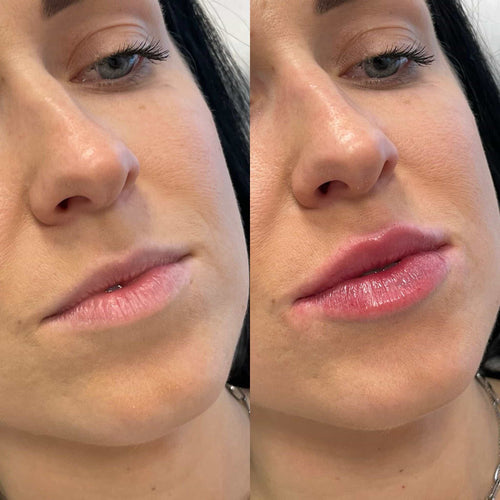Book Your Dermal Filler Session with Dr. Laura Geige Now
Safety Concerns
Hormonal Fluctuations
Hormonal fluctuations during breastfeeding can significantly impact both filler absorption and the body’s overall healing process.
Here’s a breakdown of the key safety concerns:
- Filler Absorption: Prolactin, the hormone responsible for milk production, can increase vascular permeability (the ability of blood vessels to allow substances to pass through). This means that filler might be absorbed more quickly than usual, potentially leading to less predictable or longer-lasting results.
- Inflammation and Healing: Hormones also influence inflammation and wound healing. Breastfeeding can increase your body’s sensitivity to inflammation, which could make the injection site more prone to swelling, bruising, or other adverse reactions.
- Allergic Reactions: While rare, allergic reactions to fillers are possible. Hormonal changes during breastfeeding might heighten this risk in some individuals.
It’s crucial to consult with a qualified and experienced injector who understands the specific considerations related to breastfeeding. They can help assess your individual situation, discuss potential risks and benefits, and determine if filler is appropriate for you at this time.
Breast Milk Transfer
Safety concerns regarding lip filler injections during breastfeeding primarily revolve around the potential for transfer of fillers into breast milk.
Schedule a Dermal Filler Consultation with Dr. Laura Geige Now
While there isn’t conclusive evidence demonstrating harm to infants from trace amounts of hyaluronic acid (the most common type of lip filler) in breast milk, the long-term effects are still unknown.
Some experts suggest that it’s best to err on the side of caution and avoid lip fillers until after breastfeeding has concluded.
Others may recommend waiting at least six weeks after injection before resuming breastfeeding.
It’s crucial for individuals considering lip filler injections while breastfeeding to discuss their plans with both a qualified dermatologist or plastic surgeon *and* their healthcare provider.
A thorough evaluation of the individual’s medical history, the specific type of filler used, and the duration of breastfeeding will help determine the safest course of action.
Ultimately, the decision to undergo lip filler injections while breastfeeding should be a well-informed one, taking into account both potential risks and benefits.
Consultation with a Healthcare Professional
Assessing Individual Risk Factors
Consultation with a healthcare professional is crucial before making any decisions about cosmetic procedures while breastfeeding, including lip fillers.
During this consultation, a doctor will thoroughly assess your individual risk factors to determine the potential risks and benefits of lip filler treatment for you.

Here are some key aspects a healthcare professional will consider:
-
Breastfeeding Duration and Frequency: The length of time you’ve been breastfeeding and how often your baby nurses will be factored in.
-
Type and Amount of Lip Filler: Different types of fillers have varying ingredients and potential for absorption. The amount injected will also influence the risk assessment.
-
Your Overall Health: Pre-existing medical conditions, allergies, medications you’re taking (including over-the-counter drugs and herbal supplements), and recent illnesses can all impact safety.
-
Prior Filler Experience: If you’ve had lip fillers before, the doctor will want to know about any previous reactions or complications.
Book Your Dermal Filler Consultation with Dr. Laura Geige at It’s Me and You Clinic
The healthcare professional will discuss the potential for filler ingredients to pass into breast milk and their possible effects on your baby. They will also address concerns about swelling, bruising, and other potential side effects.
Based on this comprehensive assessment, they can advise you on the safest course of action, which may involve delaying lip fillers until you’ve stopped breastfeeding or finding alternative cosmetic options.
Importance of Informed Decision-Making
Consulting with a healthcare professional is crucial before undergoing any medical procedure, especially when breastfeeding.
Lip fillers involve injecting substances into the lips to enhance their appearance and volume. These substances, often hyaluronic acid-based, can potentially transfer through breast milk.
While there’s limited research on the direct effects of lip fillers on breastfeeding infants, it’s essential to err on the side of caution.
A healthcare professional, such as a doctor or dermatologist specializing in injectables, can assess your individual circumstances, including your medical history, lactation stage, and the type of filler used.
They can provide personalized advice based on the latest scientific evidence and help you weigh the potential risks and benefits.
Informed decision-making is paramount in any healthcare context, but particularly when breastfeeding.
It involves gathering comprehensive information about a procedure, understanding its potential effects on both mother and child, and considering all available options.
By consulting with a healthcare professional, you can make an educated choice that prioritizes the health and well-being of yourself and your infant.
It’s also important to be aware that different fillers may have varying levels of safety during breastfeeding.
Openly discussing any concerns or uncertainties with your doctor is essential for making a safe and informed decision.
Alternative Treatments and Options
Dermal Fillers for Non-Nursing Individuals
When it comes to **dermal fillers**, including lip fillers, while breastfeeding, it’s crucial to prioritize both your health and the well-being of your baby.
There isn’t a definitive consensus among medical professionals regarding the safety of using dermal fillers during breastfeeding.
The American Academy of Dermatology recommends avoiding fillers while breastfeeding unless absolutely necessary due to the potential for unknown risks to the nursing infant.
This caution stems from the fact that some filler ingredients, like hyaluronic acid, could potentially be transferred through breast milk in small amounts.
However, there’s limited research on the actual impact of these trace amounts on breastfeeding babies.
Here are some alternative treatments and options to consider if you’re seeking non-surgical facial enhancements while breastfeeding:
- Natural Lip Enhancement Techniques:
- Makeup Tips for the Illusion of Fuller Lips:
- Dietary Changes:**
Experiment with techniques like gentle lip massage, using a natural exfoliator on your lips, and incorporating hydrating ingredients into your skincare routine. These methods can promote fuller-looking lips without injections.
Utilize makeup tricks like overlining your lips, using a lip liner slightly darker than your natural lip color, and applying highlighter to the cupid’s bow to create the illusion of volume.
Some individuals believe that increasing their intake of foods rich in collagen can contribute to fuller lips over time. This is a long-term approach that may not yield immediate results.
It’s essential to consult with your doctor or a board-certified dermatologist to discuss your individual circumstances and any potential risks or benefits of using dermal fillers during breastfeeding.
They can provide personalized guidance based on your health history, medication use, and the specific type of filler being considered. Your doctor can also explore alternative options that align with your desired results while prioritizing your baby’s safety.
Non-Invasive Facial Enhancements
While lip fillers can provide a temporary boost to volume and definition, it’s crucial to consider potential risks and consult with a healthcare professional before undergoing any cosmetic procedures while breastfeeding.
Here are some alternative treatments and non-invasive facial enhancements that might be more suitable during this period:
-
Hyaluronic Acid Serums: These serums can hydrate and plump the lips, providing a subtle enhancement without the need for injections.
-
Lip Plumping Glosses and Balms: Many products contain ingredients like menthol or cinnamon that temporarily increase blood flow to the lips, creating a fuller appearance.
-
Facial Exercises: Targeted exercises can help strengthen facial muscles, potentially improving lip definition over time. Results may take longer to become noticeable.
Remember that individual experiences may vary, and it’s always best to prioritize your health and the well-being of your baby when making decisions about cosmetic treatments during breastfeeding.
Consulting with a qualified dermatologist or plastic surgeon can help you explore safe and effective options tailored to your specific needs and circumstances.
Bend and Blossom Zoe Mallett Coaching Couture Lust K Aesthetics Studio
- Why Does Lip Filler Not Last On Me - November 10, 2025
- Obagi Nu-Derm System For Dark Spots And Pigmentation In Kingston Upon Thames Surrey London - November 10, 2025
- What Is The Best Treatment For 70 Year Old Skin On Face? - November 9, 2025


